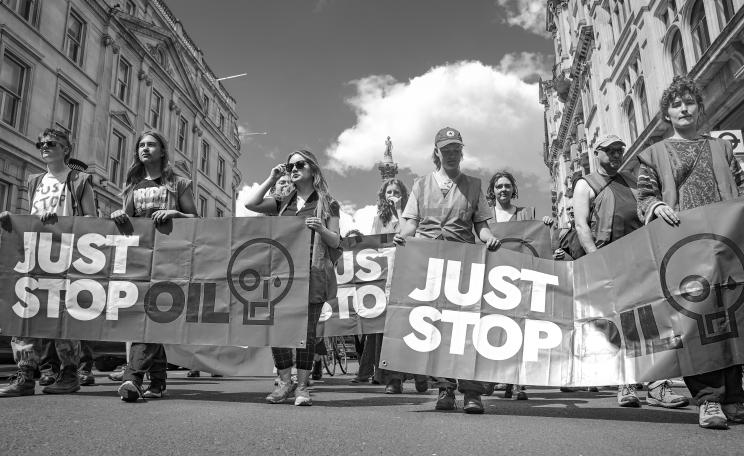When Tom Druitt set up the Big Lemon – a community interest company that runs its distinctive yellow buses on chippy oil – a year ago, he knew it would be tough. But when you’re up against an award-winning monopoly, Brighton & Hove (B&H) Buses, which runs 278 vehicles a day with 47 million journeys a year, and you have one route, five drivers and two buses, tough is not the word.
Lesser mortals might well have thrown in the oily rag, but not Tom, a 30-year-old Green Party member and keen mountaineer. It’s the photo on his desk, in pride of place, of him smiling on top of an Alaskan mountain, as well as the high-visibility jacket, that are instructive here.
Tom gets stuck in; he drives his own buses and maintains them, and it’s this approach that has recently put the company in profit.
Although, as he admits: ‘I’m not in this to make money – none of us is [business partner Graeme Simpson has a full-time job]. Basically we try and make money so we can provide a sustainable service, rather than the other way round. My aim is to make a difference.’
Fuel from waste
With that in mind, the buses run on waste vegetable oil courtesy of a growing roster of Sussex chippies and restaurants, which stops one ‘crime’ – pouring oil down the drain – and obviates another: petrol. The oil is collected by Tom’s new biodiesel supplier, Eastbourne-based Bionic Fuels. The buses can use anything between 500 and 1,000 litres a week, although Bionic Fuels recycles much more than that and sells the rest elsewhere in Sussex.
Tom is currently working with the company on a promotional campaign that will include the restaurants supplying the Big Lemon, to make it clear to paying customers that Bionic supplies the buses with fuel – meaning added value for the restaurateurs as well as for Tom, whose buses all have signs saying ‘run on recycled cooking oil’.
The buses were bought from a dealer in Tunbridge Wells, and actually didn’t need converting. All that was required was a change in the filters at the beginning of operation and again after a couple of weeks, as normal diesel, over the years, leaves a residue subsequently flushed out by the recycled oil.
What can’t be filtered out quite so easily is the smell: when you stand on Lewes Road and one of the critters goes by on the Hitchhiker’s Guide to the Galaxy-inspired route 42 (which runs between Sussex University and Brighton station) there is no mistaking the tell-tale waft of chip-shop fumes.
Mind you, there is some recompense: Tom has made it company policy that drivers are friendly and upbeat (not forgetting sweetsmelling). One regular customer to see the benefits is Laura Barraclough, a University of Brighton student. ‘You don’t get the same happy cheery drivers [with B&H Buses] that you do on the Lemon,’ she says. ‘I mean, do you really see the managing director of B&H Buses actually driving a bus and listening to students and other people’s opinions about their service? Sure they come more times during the hour, but...’
It is obstacles such as route-frequency that Tom has had to overcome – that and the bureaucracy of dealing with the local traffic commissioner, who is more geared to working with larger bus operators. Although the commissioner agreed to the student-friendly route in the first place, problems surfaced in November last year, when, due to financial and other difficulties, the Big Lemon was forced off the road without giving the required 56 days’ notice. Bearing in mind he had only one route, Tom was expecting a flexible response, but the commissioner kept the buses off the road until the 56 days had elapsed.
‘At the beginning we took on too much and the passenger numbers weren’t what we’d expected, so we needed to streamline,’ Tom explains. ‘I had six drivers in early December, and although I assured them they’d get paid at the end of the month, four left there and then.’ As a result, Tom and fellow driver Colin Manderson had to take on all the driving.
'Colin’s been in from the beginning,’ Tom says. ‘Something like this separates the men from the boys, I guess.’
Coached for success
Apart from these unforeseen hitches, it is the all-too-prevalent competition from B&H Buses that Tom and his team have been up against on a daily basis. B&H Buses run a service up and down Lewes Road every 10 minutes, and it is only the loyalty of eco-conscious students and private hires that has kept the Big Lemon bobbing along. Tom’s buses ferry students in and out of town for Tuesday club nights, and he has also laid on vehicles for protests against the third Heathrow runway, festivals and the odd wedding.
In March, the Big Lemon introduced a new cost-saving route, avoiding the traffic hotspot of Brighton station and running instead from the university to the city-centre shops, which paid bigger dividends. ‘It was great when we started to cover all our costs and make a bit extra on top,’ Tom recalls. ‘It was a long time coming, and for much of the time it seemed that the odds were against us, but it seemed, after all, that it could be done! We’ve had to raise our prices a little along the way, but our passengers have taken it well and I think they prefer to pay a little more to see us stay for good.’
The majority of the Big Lemon’s loyal passengers, approximately 200 Sussex and Brighton University students daily, have arranged public meetings that have resulted in a members club of more than 30 ‘Lemonheads’, as well as a ‘Friends of the Big Lemon’ Facebook group boasting more than 500.
With the service down during the holidays – July to September – the Lemonheads, Tom and staff are looking at buying a new coach, running a more frequent service and launching a promotional campaign along the way, with investment for all of the above coming from 100 members willing to put in a returnable £100 each. ‘We have almost all the 100 members now,’ says Tom. ‘This is a fantastic service that could one day result in more routes and – who knows? – eventually end up with franchises in other cities.’ He laughs infectiously, reminiscent of that picture on his desk.
Who’s running on veggie oil?
• Oil for boaters
Dan Carter and Jon halle are two friends who live on barges in the Oxford Canal. In 2003, they started up Goldenfuels, a small workers’ cooperative that collects waste vegetable oil from local chip shops, modifies it and sells it to boaters on the canal to use instead of diesel. It is less polluting than diesel (the company claims it brings the carbon footprint of users down by 70 per cent) and cheaper to boot (it currently sells at £1.10/litre). Carter and halle have now started to run courses in order to train other people in how to do what they’ve done. Golden Fuels
• Four cars and a minibus
Duchy College, part of Cornwall College, has switched most of its transport fleet of four cars and a minibus to run on reconstituted vegetable oil or chip fat. the college currently buys approximately 10,000 litres of biofuel from a local supplier each week. within the next year, the college plans to run the fleet on oilseed rape grown on site. this will save the college an estimated £400 per week, which would otherwise have been spent on petrol or diesel.
• Ayrshire bio-bus
Stagecoach launched a pioneering biobus initiative in Scotland in October 2007 that allows customers to exchange used cooking oil for discounted bus travel. eight vehicles in Kilmarnock run on 100 per cent biodiesel manufactured from used cooking oil and other food industry byproducts. The Biobus
• Grease To Greece
The first-ever European Banger Rally powered by waste cooking oil, from the UK to the Mediterranean, departed London on 16 August. All entrants in the Grease to Greece Bangers (and Mash) Challenge had to run their cars on cooking fat, with the aim of promoting greener fuels. Fat Finding
How to do it at home
Nearly all diesel engines can be converted to run on vegetable oil. For technical information or to purchase a conversion kit - Veggie Power - a website run by Chris Kennet, who ran a ‘veggie power’ workshop at this year’s Climate Camp. ‘there are a lot of people using vegetable oil in one form or another, including some famous names,’ he says. ‘Former F1 world champion Jody scheckter (now an organic farmer) grows rapeseed oil to fuel his £100 000+ converted tractor.’ Chris is keen to point out that some oils are more sustainable than others: ‘recycled oil is very good, as is locally produced, organic rapeseed oil.’
This article first appeared in the Ecologist November 2008







